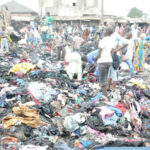There is a tiny chance that the debris from a Chinese rocket could hit Abuja this weekend.
Citing experts and officials, NBC, an American news platform, said a piece of a rocket launched by China in late April is expected to re-enter earth’s atmosphere between late Saturday and early Sunday.
- NPA debacle: Hadiza Bala-Usman faces panel over N165.3bn ‘unremitted’ funds
- 6 police officers killed in gun attacks in Rivers
“It’s 10-stories tall and twice as heavy as a school bus, and it’s set to crash back to Earth this weekend — but no one is quite sure where or when.”
“The 98-foot-long, 20-ton section of China’s Long March 5B rocket is tumbling through space in an uncontrolled orbit at 18,000 miles per hour after blasting off last month carrying part of the country’s new space station., according to experts and officials,” NBC said in its report.
Beijing, capital of China, the American cities of New York and Los Angeles, Madrid in Spain, and Rio de Janeiro in Brazil were listed as other places where the rocket could land.
Scientists say the risk of it killing anyone after it re-enters the planet is small but not impossible
In a tweet on Friday, The Aerospace Corporation, a US nonprofit research firm, said its prediction for landing was eight hours on either side of 4:19 GMT time on Sunday.
It pinpointed an area near the north island of New Zealand as a possible re-entry point but said it could happen anywhere across large parts of the planet.
Don Pollacco, a physics professor at England’s University of Warwick, who tracks space debris, was quoted to have said, “You have got a big lump of metal in space that’s in a declining orbit because it’s rubbing up against the atmosphere. It will hit the atmosphere, bounce around a bit and it’s correct to say most of the planet is covered by water, so that’s where it will likely land.
“But there’s a chance it won’t.”
Asked about the rocket Friday, Chinese Foreign Ministry spokesman Wang Wenbin said it would burn up on re-entry calling its descent “common international practice.”
“The probability of causing harm to aviation activities or activities on the ground are extremely low.” he said.

 Join Daily Trust WhatsApp Community For Quick Access To News and Happenings Around You.
Join Daily Trust WhatsApp Community For Quick Access To News and Happenings Around You.


